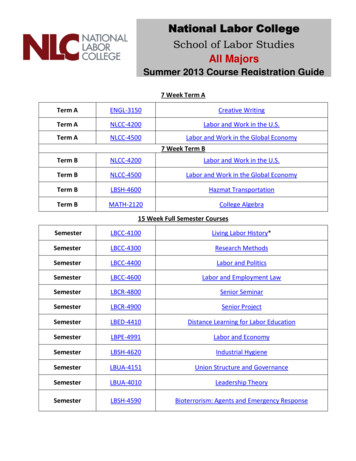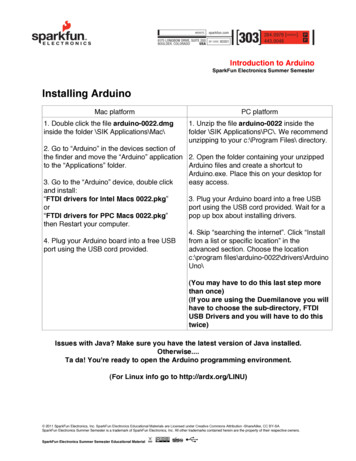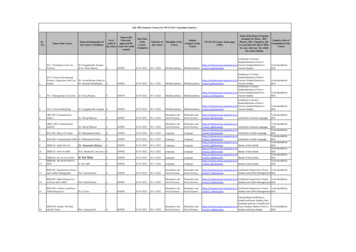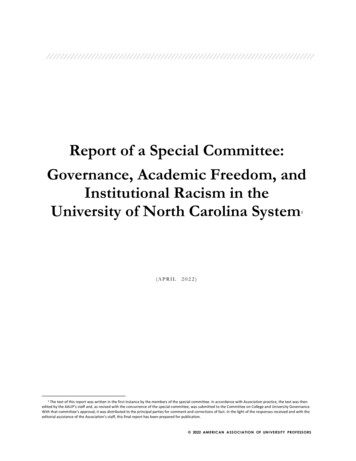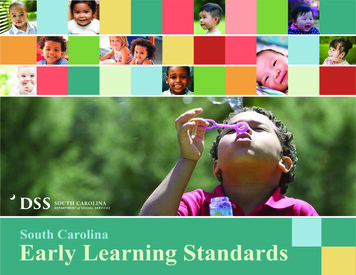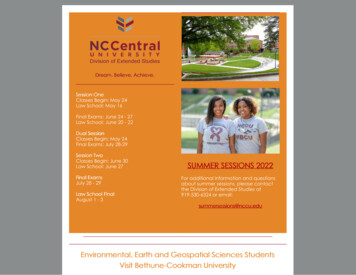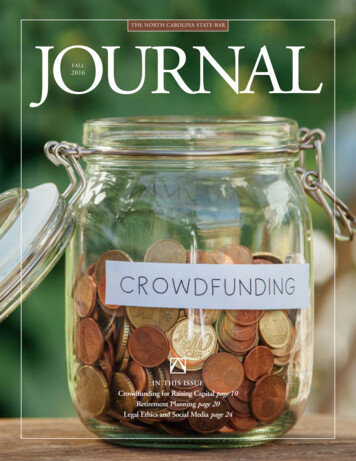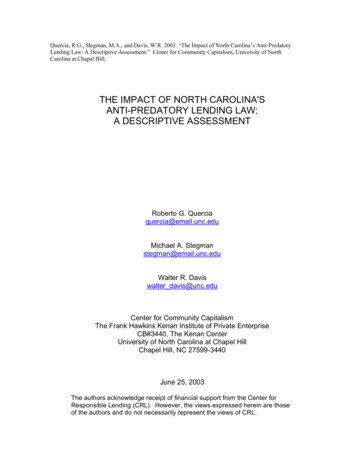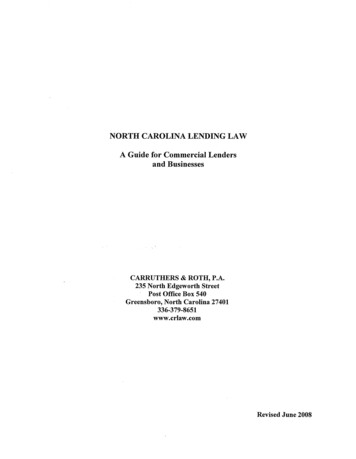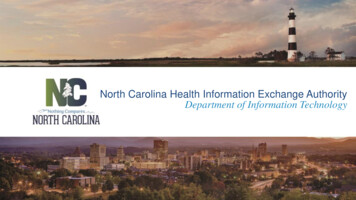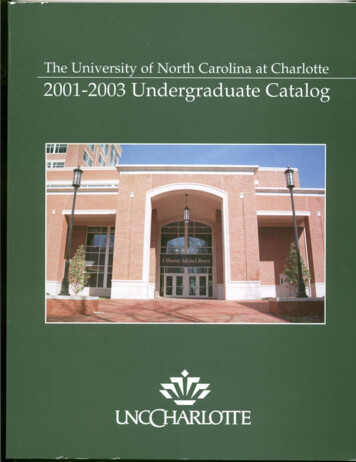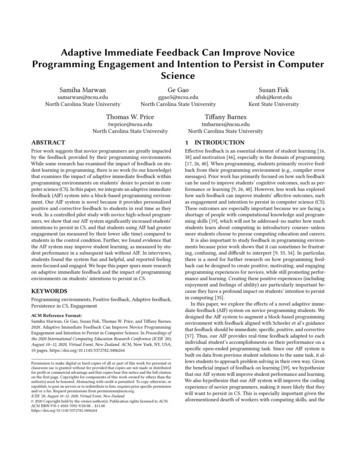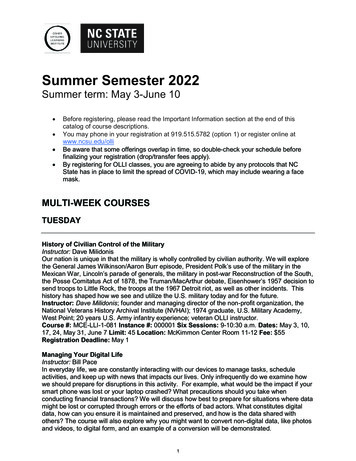
Transcription
Summer Semester 2022Summer term: May 3-June 10 Before registering, please read the Important Information section at the end of thiscatalog of course descriptions.You may phone in your registration at 919.515.5782 (option 1) or register online atwww.ncsu.edu/olliBe aware that some offerings overlap in time, so double-check your schedule beforefinalizing your registration (drop/transfer fees apply).By registering for OLLI classes, you are agreeing to abide by any protocols that NCState has in place to limit the spread of COVID-19, which may include wearing a facemask.MULTI-WEEK COURSESTUESDAYHistory of Civilian Control of the MilitaryInstructor: Dave MilidonisOur nation is unique in that the military is wholly controlled by civilian authority. We will explorethe General James Wilkinson/Aaron Burr episode, President Polk’s use of the military in theMexican War, Lincoln’s parade of generals, the military in post-war Reconstruction of the South,the Posse Comitatus Act of 1878, the Truman/MacArthur debate, Eisenhower’s 1957 decision tosend troops to Little Rock, the troops at the 1967 Detroit riot, as well as other incidents. Thishistory has shaped how we see and utilize the U.S. military today and for the future.Instructor: Dave Milidonis; founder and managing director of the non-profit organization, theNational Veterans History Archival Institute (NVHAI); 1974 graduate, U.S. Military Academy,West Point; 20 years U.S. Army infantry experience; veteran OLLI instructor.Course #: MCE-LLI-1-081 Instance #: 000001 Six Sessions: 9-10:30 a.m. Dates: May 3, 10,17, 24, May 31, June 7 Limit: 45 Location: McKimmon Center Room 11-12 Fee: 55Registration Deadline: May 1Managing Your Digital LifeInstructor: Bill PaceIn everyday life, we are constantly interacting with our devices to manage tasks, scheduleactivities, and keep up with news that impacts our lives. Only infrequently do we examine howwe should prepare for disruptions in this activity. For example, what would be the impact if yoursmart phone was lost or your laptop crashed? What precautions should you take whenconducting financial transactions? We will discuss how best to prepare for situations where datamight be lost or corrupted through errors or the efforts of bad actors. What constitutes digitaldata, how can you ensure it is maintained and preserved, and how is the data shared withothers? The course will also explore why you might want to convert non-digital data, like photosand videos, to digital form, and an example of a conversion will be demonstrated.1
Instructor: Bill Pace; BS in Industrial Engineering, NC State University; MBA from UNCCharlotte; following a long career in IT, he is happily retired and enjoying the time to pursueinterests on his own schedule; he resides in Durham with his spouse and enjoys his grandpatime.Course #: MCE-LLI-2-045 Instance #: 000001 Three Sessions: 11-12:30 p.m. Dates: May 10,17, 24 Limit: 45 Location: McKimmon Center Room 11-12 Fee: 40 Registration Deadline:May 8The Ritchie Boys--Unexpected Heroes of World War IIInstructor: Stan DarerThis class will focus on German Jewish refugees who emigrated to America to escape Hitler’sNazism, and who subsequently joined the U.S. armed forces to defeat Hitler. Trained at FortRitchie, these "Ritchie Boys" played a special role during the war. We will take a close look atthree Ritchie Boys from their pre-Hitler childhood to the terror facing their families. We will seetheir journey to America and their enlistment in the U.S. military. We will follow their training atFort Ritchie, their heroics during the war, and their involvement in the aftermath of the war andthe life they made for themselves.Instructor: Stan Darer; B.A. Economics, Lehman College, CUNY, Bronx; thirty-eight yearcareer in finance in the electrical supply industry; volunteer at several organizations in Raleigh,including the American Red Cross, Temple Beth Or, and the Bedford Over 55 Club; activemember and volunteer on OLLI's Program Committee; recipient of OLLI's Volunteer of the YearAward in 2017.Course #: MCE-LLI-2-046 Instance #: 000001 Two Sessions: 1-2:30 p.m. Dates: May 3, 10Limit: 45 Location: McKimmon Center Room 11-12 Fee: 30 Registration Deadline: May 1The Legacy of North Carolina Historically Black Colleges and UniversitiesInstructor: Linda Simmons-HenryThis lecture examines Historically Black Colleges and Universities (HBCUs) established in NorthCarolina from the antebellum period through the contemporary era. Particular attention is paid tothe broader historical contexts that shaped the development of informal and formal education,whereby African Americans’ struggle for enfranchisement worked in tandem to uphold ideals ofeducation as a quest for freedom. The growing enrollment of ethnically, religiously and culturallydiverse students at HBCUs encourages the federal government to respect and invest in theinstitutions. Legislation continues to pass that strengthens educational resources, increasesadministrative capacity and provides great financial assistance for students at these powerfulNorth Carolina HBCU institutions. HBCUs are golden products of the African diaspora andsymbols of the strength and resilience of African Americans. Their rich culture and academicrigor have allowed them to persevere despite continued obstacles, as evidenced by their longlist of notable alumni.Instructor: Linda Simmons Henry; former director of the Library and Research Center /SeniorArchivist at Saint Augustine’s University; received her professional training in library andarchival management from NC State Univ. and NC Central Univ. with a special emphasis ondocumenting African American life in the state of North Carolina; she has received severalawards for her books and career efforts in preservation and archival management, as well asher leadership in researching, documenting, and writing about the African American experiencein NC.Course #: MCE-LLI-2-047 Instance #: 000001 Two Sessions: 3-4:30 p.m. Dates: May 3, 10Limit: 45 Location: McKimmon Center Room 11-12 Fee: 30 Registration Deadline: May 1Cuba and the MobInstructors: Doug Rader, Steve SakofskyThis course will explore the history of how American mobsters were involved in the Caribbeancountries and territories that were colonized by the Spanish, French, and English. We will lookat geographic and historical linkages, discuss the various Cuban revolutions, and track theirinfluence on U.S. politics, including through the U.S. Civil War and the Spanish American War.2
American mobsters were involved in Cuba from the 1920s to early 1960s; we will discuss thebusinesses that they operated and who was involved with their operations.Instructor: Doug Rader; ecologist with a PhD in Biology from UNC-CH; he previously worked inwater quality, coastal zone management and estuary protection for the state of North Carolina;he has worked for Environmental Defense Fund for 33 years, most recently as Chief OceansScientist, working globally on ocean issues.Instructor: Steve Sakofsky; worked for 41 years in manufacturing businesses; his career wasfocused on Quality Assurance/Control; after his first retirement, he worked as a consultant;Steve has become involved with OLLI as an instructor, a member of theBusiness/Economics/Government/ Politics sub-committee, the Program Committee, and theAdvisory Council.Course #: MCE-LLI-2-044 Instance #: 000001 Two Sessions: 3-4:30 p.m. Dates: May 24, 31Limit: 45 Location: McKimmon Center Room 11-12 Fee: 30 Registration Deadline: May 22WEDNESDAYMacbeth: Something Wicked This Way ComesInstructors: Laura Jane Parker, Mia Louise Self, Wade Newhouse, David Henderson, JeremyFiebigWilliam Shakespeare’s Macbeth is a rich, poetic study of political ambition, family, andkingship wrapped in magic, witchcraft, and ghosts. Join several theatrical scholars andpractitioners in a lively exploration of this classic Shakespearian tragedy. Learn how thestructure of the text gives scholars, actors, and directors key insights into meaning andmotivation in the text. Discover the history of the play and what it meant to Shakespeare andKing James, and how keeping original theatrical contexts in mind can have an impact onmodern productions. Macbeth is filled with visions, dreams, ghosts, witches, and prophecies -learn how these gothic themes manifest and bring meaning to the play. Explore thejuxtaposition of masculine and feminine themes between Macbeth and Lady Macbeth, and howthese are turned around in surprising ways.Recommended Reading: Macbeth, William ShakespeareInstructors: (Full biographies available in online course description): Laura J. Parker; Assistant Director, Costume Design at NC State University Theatre,with a background in 14th / 16th century European clothing and textiles. Mia Self; Assistant Director, acting and directing at NC State University Theatre. Jeremy Fiebig; Professor of Theatre at Fayetteville State University; he is the founderand Artistic Director of Sweet Tea Shakespeare, a professional, non-profit theatrecompany based in Fayetteville and Raleigh, NC. Wade Newhouse; Professor, English and the Program Director of Theatre at WilliamPeace University; he is a writer, actor, and improvisational comedian and has performedwith theatre companies across North Carolina. David Henderson; Co-artistic director and founder of Honest Pint Theatre, a Raleighbased professional theatre company focused on bringing challenging works of theatreand community centered theatrical experiences to RaleighCourse #: MCE-LLI-1-082 Instance #: 000001 Six Sessions: 11-12:30 p.m. Dates: May 4, 11,18, 25, June 1, 8 Limit: 45 Location: McKimmon Center Room 11-12 Fee: 55 RegistrationDeadline: May 2The Titanic -- Facts vs. FolkloreInstructor: Fred PiersonIn this course, we will separate the facts of the Titanic tragedy from the folklore that surrounds it.Learn the reason why the Titanic and her sister ships were built, with cutting-edge technologyand as the ultimate representation of luxury comfort and speed in the Gilded Age. We'll look atthe chronology of her fateful maiden voyage from Southampton to New York in April 1912.Included in the discussion: the actions of the leadership team, the morse messages, the roles ofThe Californian and The Carpathia, the American Congressional hearing, and the British Board3
of Trade’s inquiry. Through stories and photography, we'll get to know the people involved inthe creation, building, and sinking of the Titanic. We will gain an insight into the reality of theEdwardian era on workers, the burgeoning middle class, and the aristocracy. We will alsodiscuss Harland & Wolff’s Guarantee Group, the Addergoole 14, and some of the well known,but often exaggerated, lives of individual passengers.Instructor: Fred Pierson; BS, Aeronautical Science, Embry-Riddle Aeronautical University;Triangle region business owner; coach of men’s soccer team Phoenix 25 years; collector of 18th& 19th century sterling and coin silver.Course #: MCE-LLI-2-042 Instance #: 000001 Two Sessions: 1-2:30 p.m. Dates: May 18, 25Limit: 45 Location: McKimmon Center Room 11-12 Fee: 30 Registration Deadline: May 3At the End of the ERA? – Via ZoomInstructor: Angela RobbinsWhile the Equal Rights Amendment (ERA) garnered steady popular support in the 1970s andseemed destined to be ratified before its 1982 deadline, the STOP ERA movement and otherconservative voices persuaded legislators in various states to vote against it. When Virginialegislators revived and ratified the ERA in 2020, the archivist of the U.S. determined that the1982 deadline will be observed regardless of subsequent state ratifications. Yet members ofCongress, state legislators, and organizations like the ERA Coalition challenged the deadlineand continue to push for its ratification. We will examine how conservative women were able tohalt the progress of such a popular amendment and consider what comes next for the ERA.Instructor: Angela Robbins; PhD, U.S. History, UNC-Greensboro, minor in Atlantic WorldStudies; Associate Professor, Meredith College; she specializes in women's history and socialmovements in the 19th and 20th century.Course #: MCE-LLI-2-024 Instance #: 000002 Two Sessions: 1-2:30 p.m. Dates: June 1, 8Limit: 100 Location: Zoom Fee: 30 Registration Deadline: May 26Moralists in the White HouseInstructor: Joe RetzerMost American presidents have claimed some religious affiliation, but only a few seemed to bedriven by strong moral principles based on deeply held religious convictions. These moralistswere guided by principle rather than the desire for personal power or greed. But did they makegood presidents? This course will focus on moralists John Quincy Adams and Jimmy Carter tosee how they fared as presidents, and in their later public careers.Instructor: Joe Retzer; PhD, Political Science, Yale University; taught Political Science atDavidson College for several years and then worked for more than 30 years at the U.S.Environmental Protection Agency, now retired; OLLI member, and veteran OLLI instructor.Course #: MCE-LLI-1-083 Instance #: 000001 Four Sessions: 3-4:30 p.m. Dates: May 18, 25,June 1, 8 Limit: 45 Location: McKimmon Center Room 11-12 Fee: 40 RegistrationDeadline: May 16THURSDAYSouthern Press in the Civil WarInstructor: Frank FeeWith the outbreak of hostilities between the South and North in 1861, interest in the newscolumns soared everywhere. But as the war progressed, Southern newspaper editors facedunique challenges, often desperate when resources – paper, ink, advertising, money, andmanpower – shriveled. Even within the Confederacy, there was a war of ideas. As battles ragedaround them, Southern editors debated the merits of the war and their leadership, especiallyPresident Jefferson Davis. This lecture series surveys news gathering and distributionthroughout the South from 1861-1865, with a special focus on North Carolina and the RaleighChapel Hill area. Topics will include reporting and publishing war news, the struggle to remainpublishing, political debate in the newspapers, and the print culture of the day.4
Instructor: Frank Fee; Ph.D. from UNC-Chapel Hill; MA from State University of New York atBrockport; BS from Cornell University; retired in June 2011 as an associate professor inSchool of Journalism and Mass Communication at UNC-CH, where he taught graduate andundergraduate media history courses for many years; prior to entering the academy full time, hewas an editor and reporter in daily newspapers for nearly 35 years and taught journalism parttime at the college level for more than 10 years; research interests include journalism history,with a focus on antebellum U.S. newspapers and the journalism of Frederick Douglass,newsroom management, trends in American journalism, and news accuracy.Course #: MCE-LLI-2-043 Instance #: 000001 Three Sessions: 11-12:30 p.m. Dates: May 5,12, 19 Limit: 45 Location: McKimmon Center Room 11-12 Fee: 40 Registration Deadline:May 3LECTURESMONDAYCryptology and American Secrets – Via ZoomInstructor: Jennifer WilcoxLearn about the NSA's National Cryptologic Museum and be introduced to the secret of secrets.We will discuss the history of American cryptology, beginning with the hidden messages of theAmerican Revolution through the first supercomputers, and everything in between. Thepresentation highlights the history, technology, and people bringing the secret world of secretsto you.Instructor: Jennifer Wilcox; began her career at the National Security Agency in 1986 and hasbeen the Director of Education for the agency’s National Cryptologic Museum since 1999; shehas conducted extensive research in cryptologic history which has resulted in visitor programs,brochures, articles, presentations and museum exhibits.Course #: MCE-LLI-3-069 Instance #: 000001 One Session: 11-12:30 p.m. Date: May 23Limit: 100 Location: Zoom Fee: 15 Registration Deadline: May 19Ethersounds: A Brief History of Electronic Music – Via ZoomInstructor: Thomas William KarchesElectronic music is not a modern invention -- it has been around since the early 1900s. Learnabout the history of electronic music and hear examples of the most influential electronicinstruments over the last 120 years. You have probably heard of Robert Moog, but there aremany other artists and engineers whose work was essential to the current state of electronicmusic. We will also explore the creation of electronic music on iPads, iPhones and otherdevices.Recommended Reading: http://120years.net and http://cdm.linkInstructor: Tom Karches; BS in Computer Science, pursuing an MA in Education; he has beenworking in IT and technical training for 40 years, currently at NC State University; he is a longtime electronic and experimental music enthusiast.Course #: MCE-LLI-3-079 Instance #: 000001 One Session: 1-2:30 p.m. Date: May 23Limit: 30 Location: Zoom Fee: 15 Registration Deadline: May 19TUESDAYCreating Your Cut Flower GardenInstructor: John M. DoleCut flowers bring life and joy into our lives and help us memorialize special events. Learn how toset up, plant, and maintain a cut flower garden at your home. We will discuss which species andcultivars are easy to grow, productive, and beautiful.5
Instructor: John Dole; BS, Michigan State; PhD, University of Minnesota; Professor,Horticultural Science, and Associate Dean, College of Agriculture and Life Sciences, NC State;he researches the selection, production, and postharvest handling of cut flowers and teachesPhysiology of Flowering; he has co-authored eight books, including three on cut flowers.Course #: MCE-LLI-3-070 Instance #: 000001 One Session: 11-12:30 p.m. Date: May 3Limit: 45 Location: McKimmon Center Room 11-12 Fee: 15 Registration Deadline: May 1Toy Trains: Not Just for Kids!Instructor: Charles KnightAmong the most popular toys of the 1950s were toy trains – the latest offerings from Lionel,American Flyer, and Marx raced around department store windows at Christmas time, attractingthe attention of many a smiling young boy and girl. While the two decades following World WarII represented the height of popularity for the hobby, miniature railroads still fascinate young andold alike today. From Thomas the Tank Engine to the most detailed scale replica, model trainsand toy trains come in all sizes and to fit any budget today. This lecture examines the history oftoy trains, explains the difference between model trains and toy trains, and how to get a newgeneration interested in the hobby of model railroading.Instructor: Charles Knight; has worked in the museum field for more than 20 years, and iscurrently Curator of Military History at the North Carolina Museum of History; his main field ofstudy is the American Civil War; has written numerous journal articles and his first book, ValleyThunder: The Battle of New Market, was published in 2010; currently working on a biography ofConfederate general William Mahone while his second book, From Arlington to Appomattox:Robert E. Lee’s Civil War Day by Day, was published in June 2021; he has been an avidcollector of toy and model trains his whole life.Course #: MCE-LLI-3-084 Instance #: 000001 One Session: 11-12:30 p.m. Date: May 31Limit: 45 Location: McKimmon Center Room 11-12 Fee: 15 Registration Deadline: May 29Planets in the Habitable ZoneInstructor: Rachel SmithBefore Earth was teaming with life, Mars had flowing rivers and a likely ocean, and Venus, nowa searing hothouse, was a blue world with possible life. Beyond our solar system, there could bebillions of Earth-like planets, many of which could be inside the habitable zone of their hoststar(s). In this lecture we will explore what makes a planet habitable, what could have causedour closest neighbors to leave the Sun's habitable zone, and future scenarios for Earth. We willventure to some of our closest and strangest exoplanet neighbors, and discuss techniquesbeing developed to explore exotic alien atmospheres. Is our future tied only to Earth? Whatwould it take to move us to our closest planetary neighbors, or to the stars?Instructor: Rachel Smith; BS and DVM, Cornell University; MS and PhD, UCLA; PostdoctoralScholar, Caltech; currently Head of the Astronomy & Astrophysics Research Lab and Curator ofMeteorites, NC Museum of Natural Sciences; Associate Professor, Dept. of Physics &Astronomy, Appalachian State University; Adjunct Professor, Dept. of Physics & Astronomy,UNC-Chapel Hill.Course #: MCE-LLI-3-082 Instance #: 000001 One Session: 1-2:30 p.m. Date: May 17Limit: 45 Location: McKimmon Center Room 11-12 Fee: 15 Registration Deadline: May 15Back on Your Feet: Managing Foot and Ankle PainInstructor: Hanif HussainiThis lecture will explore some of the more common foot and ankle conditions adults mightexperience, including arthritis, plantar fasciitis, gout, ankle sprains, hammer toes, and bunions.We will discuss how these conditions develop, how to treat them, and some simple steps thatyou can take to help prevent the development of some of these conditions. Note: This lecture isintended to provide general information, and is not a substitute for evaluation by a medicalprofessional.Instructor: Hanif Hussaini, MD; BS in Mathematics, Duke University; MD, Saint LouisUniversity; Internship/Residency in Orthopaedic Surgery, Wake Forest University; Fellowship inOrthopaedic Foot and Ankle Surgery, The Orthopaedic Foot and Ankle Center, Falls Church,6
VA; Dr. Hussaini has a strong clinical interest in all aspects of foot and ankle care, includingfracture care, trauma, sports medicine, arthritis treatment, bunion and hammertoe care, complexfoot reconstruction, and joint replacement; Dr. Hussaini has presented his research in the fieldof orthopaedic foot and ankle surgery at several national and state conferences; he haspublished multiple peer-reviewed papers and co-authored a book chapter on the use ofsynthetic graft for the treatment of peroneal tendon disorders; he is an active member of theAmerican Academy of Orthopaedic Surgeons and the American Orthopaedic Foot and AnkleSociety.Course #: MCE-LLI-3-075 Instance #: 000001 One Session: 1-2:30 p.m. Date: May 24Limit: 45 Location: McKimmon Center Room 11-12 Fee: 15 Registration Deadline: May 22WEDNESDAYBioarchaeology: Reconstructing Life from the SkeletonInstructor: Julie K WespThis lecture will discuss how bioarchaeologists analyze human skeletal remains to help usunderstand aspects of daily life in the past. During life, the human body is a dynamic livingtissue that develops and changes in response to our lived experiences in our social, cultural,and natural environment. Physical traces of our life become incorporated into the skeleton andbioarchaeologists can use these clues to identify an individual’s age at death, sex, diet, relativehealth status or disease they might have suffered, or daily activities and other biomechanicalstress. These bodily archives of experiences can then show us how life has varied through timeand space. Note: This presentation will include images and discussion of human skeletalremains recovered from archaeological contexts.Instructor: Julie K. Wesp; Ph.D., University of California, Berkeley; Assistant Professor in theDepartment of Sociology and Anthropology and Faculty Affiliate with the Science, Technology,and Society Program, NC State; bioarchaeologist with expertise in Pre-Contact and ColonialLatin America, current research focuses on ancient DNA of African descendants in ColonialMexico and co-director of the Temple of San Ignacio Archaeological Project in Bogotá,Colombia.Course #: MCE-LLI-3-085 Instance #: 000001 One Session: 9-10:30 a.m. Date: May 11Limit: 45 Location: McKimmon Center Room 11-12 Fee: 15 Registration Deadline: May 9Introduction to Shamanism and Shamanic Healing – Via ZoomInstructor: Mara BishopShamanism offers practices to connect to the wisdom that resides in the natural and spiritualworld, and within ourselves. Especially in times of change and upheaval, having a spiritualpractice where we can directly connect to our own sources of guidance can be very helpful. Aswe become more aware of the “spirit” in the classic “body-mind-spirit” trilogy, shamanism canalso provide a complementary model for wellness and preventative self-care. This lecture is anintroduction to the basic premises of core shamanism, avoiding cultural appropriation in creatingpersonal practices, cross-cultural beliefs, healing modalities, and shamanic journeying.Instructor: Mara Bishop; MA, Columbia University, Teachers College; has over 25 years ofexperience helping people find spiritual health and well-being; she is a frequent guest speakerfor UNC Medical Center, Duke University, and the Rhine Research Center; Mara’s workincludes Shamanism for Every Day and Shining Bright Without Burning Out; more informationcan be found at WholeSpirit.com.Course #: MCE-LLI-3-072 Instance #: 000001 One Session: 11-12:30 p.m. Date: June 1Limit: 35 Location: Zoom Fee: 15 Registration Deadline: May 26Preventing Burnout in Challenging Times – Via ZoomInstructor: Mara BishopOur world is energetically and technically interconnected. In many ways that interconnection is apowerful collective tool, but we need healthy boundaries to avoid absorbing the pain we oftenperceive in others and in the world at large. This session is an introduction to understanding and7
adjusting our personal energetic boundaries so we can avoid empathic overload and burnout.Topics include navigating your personal energy ecosystems, understanding your uniqueenergetic temperament, and meditations to build resilience and reduce the chances of burningout.Instructor: Mara Bishop; MA, Columbia University, Teachers College; has over 25 years ofexperience helping people find spiritual health and well-being; she is a frequent guest speakerfor UNC Medical Center, Duke University, and the Rhine Research Center; Mara’s workincludes Shamanism for Every Day and Shining Bright Without Burning Out; more informationcan be found at WholeSpirit.com.Course #: MCE-LLI-3-073 Instance #: 000001 One Session: 11-12:30 p.m. Date: June 8Limit: 35 Location: Zoom Fee: 15 Registration Deadline: June 2THURSDAYReligious Trends --The Future of ChurchesInstructor: David HughesWe will explore some of the formidable challenges facing churches, including the impact ofCOVID-19 upon church attendance and participation, the widespread scandals including sexualharassment and assault, political fragmentation that has strained relationships withincongregations, and the hard questions that racial unrest has raised for many churches. Theseand other challenges have resulted in many clergy leaving their ministry positions, and manyothers considering leaving. All of this suggests a very different future for the churches, one thatbears little resemblance to what we have known during our lifetimes.Instructor: David Hughes; PhD in Christian Ethics from The Southern Baptist TheologicalSeminary; degrees from Wake Forest University and Princeton Theological Seminary; semiretired and working part time as Ambassador of the Transforming Center, a Chicago-basedministry devoted to strengthening the souls of key influencer and the organizations they serve;also serves as a spiritual director currently and previously as senior pastor of several churches,including a 22 year tenure at First Baptist Church Winston-Salem.Course #: MCE-LLI-3-086 Instance #: 000001 One Session: 11-12:30 p.m. Date: June 2Limit: 45 Location: McKimmon Center Room 11-12 Fee: 15 Registration Deadline: May 31The Climate Crisis: How to Fix It?Instructor: Walter A RobinsonThe climate crisis is here. This lecture first offers a brief introduction to the science of climatechange. The science tells us we must act now to avoid outcomes of global warming that willdisproportionally and disastrously affect the poorest and most vulnerable people andcommunities. Many actions must be taken together to mitigate global warming. The mostsignificant of these are discussed. We raise (but do not answer) three questions: 1) is nuclearpower needed to address climate change? 2) should we consider geoengineering? 3) can we fixthe climate without fundamentally transforming our economy and society?Instructor: Walt Robinson; Professor of Atmospheric Sciences at NC State, holds BS and MSdegrees In Physics from the University of Pennsylvania and a PhD in Geological Sciences fromColumbia; his research and teaching address the dynamics of the atmosphere and climate.Robinson is a Fellow of the American Meteorological Society.Course #: MCE-LLI-3-071 Instance #: 000001 One Session: 1-2:30 p.m. Date: May 19Limit: 45 Location: McKimmon Center Room 11-12 Fee: 15 Registration Deadline: May 17A Brief History of JuneteenthInstructor: Arwin Doremus Smallwood PhD.This lecture will share the history and importance of Juneteenth. You will gain an betterunderstanding of the impact of slavery on, not just African Americans, but all Americans, andthe historic efforts required to abolish it. You will learn why the celebration brings a strong senseof pride about the commitment that African Americans have made to the betterment of theirlives, and for their children, grandchildren, and all past and future generations. We will also8
discuss slavery in North Carolina and how over 5,000 African Americans, whites, and NativeAmericans fought to end slavery and improve the lives of all North Carolinians after the CivilWar.Instructor: Arwin D. Smallwood; Professor and Chair of the Department of History and PoliticalScience at NC A&T University; MA in History, North Carolina Central University; he received hisPh.D. in early U.S and African-American history from The Ohio State University in 1997; Dr.Smallwood is a Life member of the American Historical Association, the Southern HistoricalAssociation and the Association for the Study of African American Life and History; he is also amember of the Historical Society of North Carolina, Phi Alpha Thet
including the American Red Cross, Temple Beth Or, and the Bedford Over 55 Club; active member and volunteer on OLLI's Program Committee; ecipient of OLLI's Volunteer of the Year r Award in 2017. Course #: MCE-LLI-2-046 . Instance #: 000001 . Two Sessions: 1-2:30 p.m. Dates: May 3, 10 . Limit: 45 . Location: McKimmon Center Room 11-12 . Fee: 30
